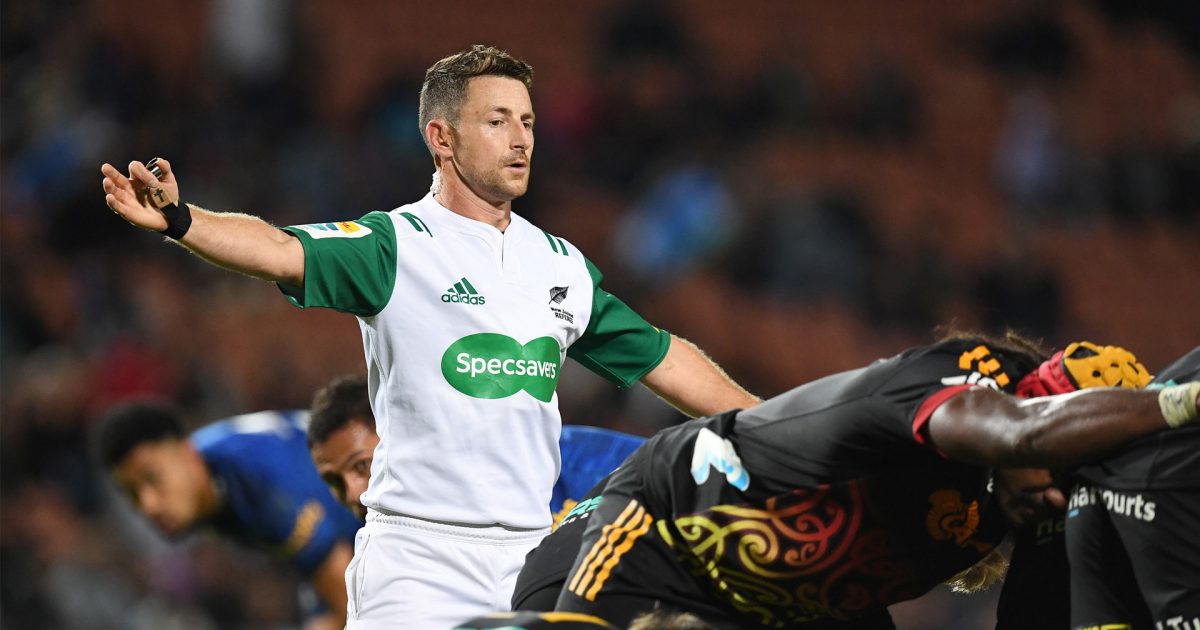Why the Chiefs have reason to feel aggrieved with referee Paul Williams

While the Chiefs were undoubtedly their own worst enemies on Saturday night, failing to take advantage of three yellow cards dished out to the Blues throughout their clash at Waikato Stadium, they also have reason to be aggrieved with the officiating in the final quarter of the match.
Blues lock Luke Romano, halfback Sam Nock and replacement prop Marcel Renata were all forced to spend 10 minutes on the sidelines during the game and if the Chiefs had a bit more patience on attack either side of halftime, they may have been able to eke some more offences out of their opposition and referee Paul Williams would have had no choice but to go to the pocket for the persistent indiscretions from the Blues.
The Chiefs chanced their arm on attack, however, and still weren’t able to come out trumps. Come Renata’s yellow card in the 63rd minute, they’d scored zero points, despite their wealth of possession and territory, coupled with their man-advantages.
When Renata was ordered to the sidelines, his position on the field was filled by starter Ofa Tuungafasi, who had been benched only minutes earlier to ensure the Blues had two props on the field for scrums. That change meant loose forward Tom Robinson also had to leave the pitch so that the Chiefs still had their one-man advantage.
Not long after Tuungafasi had returned to the field, however, did the All Blacks prop have to again take a leave of absence after blood began gushing out of his head following some big hits on defence.
With Tuungafasi off the pitch, Robinson was originally shoulder-tapped to return to the field before the Blues were forced to put hooker Kurt Eklund back on the pitch. As stipulated by Law 3.18, ‘only when no replacement front-row player is available is any other player permitted to play in the front row’.
Had Tuungafasi been forced off the field due to a regular knock, as opposed to a blood bin or HIA, the Blues would have been forced to play with 13 men (as was the case during Italy’s Six Nations clash with Ireland earlier this year) but the blood trickling down Tuungafasi’s head saved their blushes in this instance.
Renata’s yellow card combined with Tuungafasi’s blood-binning meant that the Blues had no suitable tightheads available and uncontested scrums were appropriately ruled necessary by referee Williams. Where the referee made an error, however, was at the two subsequent scrums that occurred during Renata’s time in the sinbin.
Under Law 3.15, uncontested scrums must have eight players pack down from either side – even if one team only has seven forwards on the park. This ensures that a team who has received a yellow card is still penalised at scrum-time, even if the team with a full forward pack can’t push them off the ball, because it forces them to effectively play with one less man in the backline.
In the 68th and 69th minutes of the match, the Blues operated with just seven men in their scrum – but the uncontested nature of the contest meant the Chiefs weren’t given any advantage at the set-piece.
Williams should have required one of the Blues back to pack down, which would have given the Chiefs a one-man advantage in the backline.
At this stage of the game, the Chiefs were already down by 20 points and were all but out of the running – but it was still a major error on Williams’ behalf regardless, and the Chiefs may well have found a way to at least notch up some points in the contest. Similarly, Chiefs captain Sam Cane should have raised the issue with the referee.
The Chiefs have no one to blame but themselves for their shortcomings on Saturday night but their inability to convert opportunities into points doesn’t excuse referee Paul Willims from failing to officiate the scrums correctly late in the match.












































































If you can’t score when the other team is down to 13 players you are never going to score